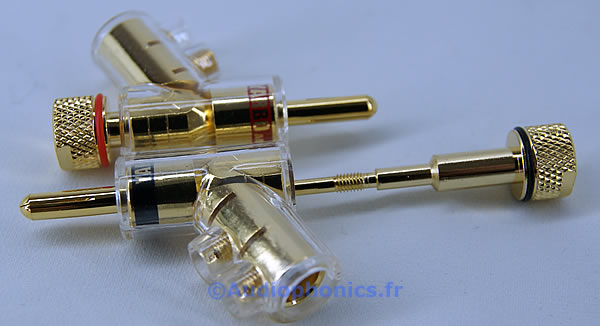I’ve been happily using Bluejeans locking bananas on one end of my Canare 4S11 speaker cables (the other end has a SpeakON connector) and thought I would add locking banana termination to another set of speaker cables for my living room system.
I’ve seen Nakamichi locking banana plugs listed on eBay and thought I’d give them a try as they were reasonably priced ($23 for 4 pairs shipped) so I ordered some from http://www.nakamichiplug.com/. Overall I am dissatisfied with them and ordered more blue jeans locking banana plugs to replace them.
Since I now have both, I thought others can benefit from a comparison
lead times: The Nakamichi plugs took 4 weeks to arrive with no tracking while the blue jeans plugs arrived in 2 days
customer service: I have found blue jeans to be very responsive in the past although I did not have to contact them for this order. Nakamichi plug still hasn’t responded to my “where’s my order” email nor my request for a return.
here are the two plugs side by side: blue jeans on the bottom

the Bluejeans plug has a removable collar to accommodate different jacket sizes as shown below while the Nakamichi opening is huge

the following photo shows the two plugs disasembled ( Bluejeans on the left)

the main problem is that the Nakamichi plug screws are not long enough to clamp down securely on these 11 gauge cables, maybe they would work on giant cables but not on reasonably large cables.
this is the Bluejeans plug assembled

And a comparison of the Bluejeans vs Nakamichi plugs assembled

In addition to the insecure fit of the Nakimichi plug they also tended to get stuck in the locked position even when the collar was unscrewed
overall I rate the Bluejeans plug excellent and the Nakamichi plug poor. I will be returning the Nakamichi plugs if they respond to my email and honor their stated 30 day return policy.
Wayne
I’ve seen Nakamichi locking banana plugs listed on eBay and thought I’d give them a try as they were reasonably priced ($23 for 4 pairs shipped) so I ordered some from http://www.nakamichiplug.com/. Overall I am dissatisfied with them and ordered more blue jeans locking banana plugs to replace them.
Since I now have both, I thought others can benefit from a comparison
lead times: The Nakamichi plugs took 4 weeks to arrive with no tracking while the blue jeans plugs arrived in 2 days
customer service: I have found blue jeans to be very responsive in the past although I did not have to contact them for this order. Nakamichi plug still hasn’t responded to my “where’s my order” email nor my request for a return.
here are the two plugs side by side: blue jeans on the bottom
the Bluejeans plug has a removable collar to accommodate different jacket sizes as shown below while the Nakamichi opening is huge
the following photo shows the two plugs disasembled ( Bluejeans on the left)
the main problem is that the Nakamichi plug screws are not long enough to clamp down securely on these 11 gauge cables, maybe they would work on giant cables but not on reasonably large cables.
this is the Bluejeans plug assembled
And a comparison of the Bluejeans vs Nakamichi plugs assembled
In addition to the insecure fit of the Nakimichi plug they also tended to get stuck in the locked position even when the collar was unscrewed
overall I rate the Bluejeans plug excellent and the Nakamichi plug poor. I will be returning the Nakamichi plugs if they respond to my email and honor their stated 30 day return policy.
Wayne




